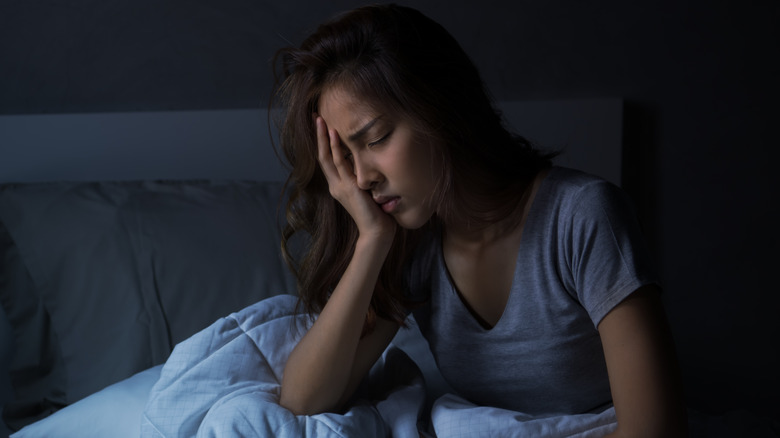How CBD Can Help If You're Suffering From Depression
You've most likely heard of cannabidiol, commonly referred to as CBD, but what you may not know is what exactly it is, or what it can do. Simply put, CBD is a chemical compound found in the cannabis plant that is purported to help with mental health issues like anxiety and depression (via The New York Times). In comparison to other medications, CBD is thought of as mostly safe. This is because, unlike the psychoactive effects of smoking cannabis, CBD is extracted from a cannabis plant, but won't cause the physical effects associated with the plant (via Discover Magazine).
CBD is often associated with hemp oil, as both offer similar benefits. Hemp has traditionally been used as an alternative for those nervous about the 'high' of cannabis, as it contains no cannabidiol at all (via Medical News Today). Whereas hemp uses the seeds only, CBD is extracted from many different areas of the cannabis plant. This means there's a slightly higher risk of THC inclusion, though not nearly enough to get you high due to strict regulation (via FDA). THC is the cannabinoid usually found in marijuana, and, while they're both cannabinoids, CBD does not have the ability to produce the same effects as THC and is therefore classified as nonintoxicating (via Healthline).
With all this information you may be wondering how CBD can help you, which is why we've laid out how it may help to relieve symptoms of depression and other mental health issues below.
Its effects on depression are still being examined
As outlined in data from the National Insitute of Mental Health, approximately 21 million adults in the US experienced a major depressive episode in 2020. This makes up 8.4% of the US adult population. A major depressive episode is defined as "a period of at least two weeks when a person experienced a depressed mood or loss of interest or pleasure in daily activities." Symptoms of a depressive episode vary but can include insomnia, concentration issues, low self-esteem, and problems with eating. So, how can CBD help if you are experiencing any of these symptoms? Many studies have been done, but all on animal species (via Psych Central). Because of this, it cannot be said for certain if humans would experience the same benefits.
In one 2014 study, CBD appeared to affect the 5-H1TA receptors, aka the serotonin receptor. Serotonin is what gives us the feeling of happiness and contentment, which is why low levels of serotonin are usually seen in those suffering from anxiety and depression. Another 2018 study suggested that CBD could affect stress levels positively, which is significant as depression is often brought upon by high stress levels. Additionally, Forbes recounts how a study conducted on mice revealed CBD produced an effect close to the antidepressant imipramine. Nevertheless, further human trials would be required to fully prove if these effects are as beneficial for people.
CBD can be ingested via a range of methods
Not just available in one form, CBD can be ingested and taken in a variety of ways. Even skincare brands are finding a way to add CBD to their products. According to a survey conducted by Forbes, 58% of people take CBD via gummies or other food-related substances. Not far behind at 55%, many were found to use CBD through oil, tinctures, or capsules. The least popular method of taking CBD was via the flower itself, though 16% still said this was their preferred method. Lotions and topicals were also relatively popular, with a percentage of 53% and 42% respectively.
Crucially, vapes claimed 32% of the vote. Vaping has risen vastly in popularity in the past few years, though its side effects are still being discovered. Originating as a supposed safer alternative to cigarettes (via ITV,) most vapes still contain nicotine and therefore are not risk-free. Still, if you are a regular vape user, inhaling your daily dose of CBD would kill two birds with one stone, always practical if you don't have much spare time.
However you choose to take CBD, there are plenty of options on the market these days. Although research is still being conducted, it definitely seems it can have a positive impact on a range of mental health issues, including depression.


